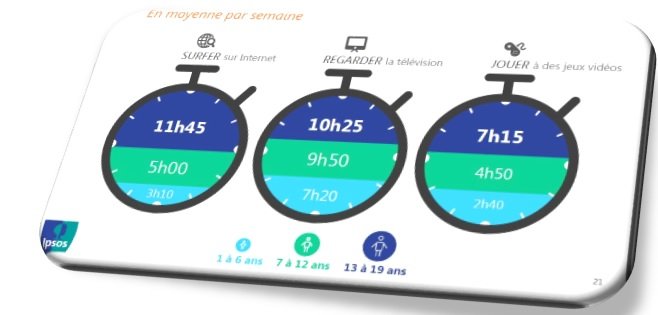
TV, smartphone, tablet, or computer screens now have an important place in our lives and especially in our children. What are the dangers, or conversely the benefits of such exposure on the health of smaller?
The child and screens
At a time when the shelves are entering the benches of our schools, the question of the effects on the moral or physical health of our little darlings arises. The studies on the issue are many and our first observation is that the results differ depending on age, time spent, the time of day or digital media used!
In 2013, the prestigious Academy of Sciences makes a highly anticipated report. "The child and screens" is the effect of a bomb in science and education. Indeed, it points out the various dangers of concentration, behavior and the child's memory but we especially indicates that the screen can be a great tool for understanding, learning, and all other cognitive functions. "We see too often the negative aspects, worries that arouse screens, but there are also many positive aspects" , says Jean-François Bach, Permanent Secretary of the Academy of Sciences, exposing the report to the press.
Exposure to Is screens harmful for our children?

Psychological effects
The report denounces "passive exposure," in other words, exposure to screens without interaction of the child. This clearly means a guilty that we all know and that sits in the great majority of French households: The TV screens. This lack of interactivity makes the child no longer able to communicate, think, altering his creativity up to have language delays, sleep disturbances or a rift in the family environment neglecting communication between its members. In addition, images are sometimes violent or unsavory for a child, which can cause behavioral disorders, with the results of depression in shorts.
Psychosomatic effects
Physically, there is also that children who have an addiction to screens are sometimes plagued with weight gain by lack of exercise and body movement is thereby also greatly affected. Pediatricians caring for children affected by obesity often find a correlation between lack of physical activity and too much time spent in front of a screen and we warn of physiological complications that can result. The child is the target voluntarily or not, advertising. A study by Harvard University published in the medical journal "The Journals of Pediatrics" means clearly "children are exposed to a lot of advertisements on food and drinks, so it makes sense that excessive use of these devices is associated with overconsumption of sugary drinks and obesity risk 'Erika Kenney, co-author of the study. Given these results, it is the responsibility of parents to limit the time spent in front of a screen and to control in order to preserve the child.
When the digital promotes learning

The shelves in the school, the advent of a 2.0 Education:
The concern of parents and teachers is seen by cons swept by the report of the Academy of Sciences. The latter says even strongly encourage the use of touch pad, from the age of 6 months with the accompaniment of an adult. The tablet would accompany the construction of a form of intelligence that would allow the child to make faster decisions. "The digital intelligence could be smoother, faster and multitasking that classical literary culture, slower but deeper. But these two cultures are not incompatible, and if our children learn to juggle both, combine them, they will do wonders which previous generations would not be able "confides Olivier Houde, a psychologist specializing in child development (co -author of the report).
Learning through play:
The fact remains that each child spends on average 2 to 5 hours per day of screen and the brain of our kids needs rest. Exposure to screens, more than ever need support if not a real supervision of parents or teachers. However, recall Idriss Aberkane, doctor of neuroscience and author of "Free your mind" in a very simple way "the game is the natural way to learn to mammals ... and more an animal is more he plays smart ... education should be based on the video game industry, when you lose a game and we start it's not necessarily the case at the school for a math problem "And what better tool and offering such attractive ergonomics by the game screens to attract the attention of a child and make him want to learn by taking pleasure in doing so.